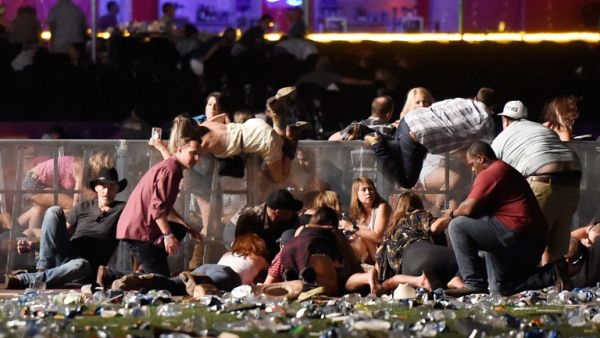- After 59 were killed in a mass shooting in the U.S., many demanded it be called "terrorism"
- It was claimed that authorities were retiscent to label it terror because the perpetrator was not Muslim
- In fact, legal definitions of terrorism are highly specific
- This was a case of a crime for which the motive was not known, rather than an Islamophobic double-standard
by Rosie Alfatlawi
On Sunday, at least 59 were killed, and over 500 were injured, when a white man in his sixties opened fire on a music concert in the U.S. The incident, the worst mass shooting in U.S. history, is not being treated as an act of terrorism.
When a non-Muslim commits a horrific act of mass violence, discussion inevitably turns to the “t-word” and its usage.
Authorities in the U.S. and Europe, some claim, are all too willing to brand acts carried out by Muslims as “terror”.
At the same time, they argue, white perpetrators of massacres are labeled “mentally unstable” or given excuses for their behavior.
When is a terrorist not considered a terrorist? When he is a white man holding the gun. #LasVegasShooting
— سامي (@xsmyak) October 2, 2017
A guy who secures a high firing point, carefully stocks it w unusual, powerful weapons, kills 58 innocents, wounds over 500, is a terrorist.
— southpaw (@nycsouthpaw) October 2, 2017
The implication of this rhetoric is that non-Muslims only do bad things when they go off the rails, but Muslim violence is undertaken consciously by fully “evil” individuals.
This is, of course, an inaccurate generalization.
While Omar Mateen was branded an Islamist terrorist for his attack on a gay nightclub in Florida, it soon emerged that he had personal difficulties that directly contributed to his actions.
With behavioral problems and an obsession with violence from an early age, Mateen may have been bipolar. There was also speculation that he himself was gay.
Going further than the terrorist label in this case revealed multiple motives and reasons behind what seemed, on the surface, to be a textbook Islamist terrorist attack.
- Were the UK Media Really Slow To Call Finsbury Park a Terror Attack?
- Americans use #Iwillregister to defy Trump’s proposed 'Muslim registry'
Defining terror
It has been said that “one man's terrorist is another man's freedom fighter”.
Terrorism can certainly be a deeply subjective term, although in all understandings it is a negative descriptor. The phrase is used by politicians, commentators and others to refer to violence carried out by opponents and enemies.
For instance, in Syria, Bashar al-Assad and his allies refer to opposition fighters as “terrorists” to justify attacks against them. In Saudi Arabia, the persecution of its Shia minority is often framed as the fight against terrorists.
In 2003, to justify its war in Iraq, the Bush administration claimed Saddam Hussein was a sponsor of terror.
When used in that way, terrorism appears to cease to have a concrete meaning.
But, terrorism can and does have a clear definition.
When the media respond to an incident, they report on how law enforcement agencies are treating it.
Those agencies categorize violence very specifically according to legal guidelines.
For instance, in U.S. federal law, "domestic terrorism" denotes activities that:
- Involve acts dangerous to human life that violate federal or state law
- Appear intended (i) to intimidate or coerce a civilian population; (ii) to influence the policy of a government by intimidation or coercion; or (iii) to affect the conduct of a government by mass destruction, assassination, or kidnapping
- Occur primarily within the territorial jurisdiction of the U.S.
As the second point here shows, terrorism is typically defined as having an explicitly political goal.
In the case of Stephen Paddock, the Las Vegas shooter, no motive has so far been determined.
“We don’t know what his belief system was at this time,” Clark County Sheriff Joseph Lombardo said on Monday, while investigators were still trying to assertain a motive on Tuesday.
His brother, Eric Paddock, told reporters that Stephen had "no religious affiliation, no political affiliation".
Given the mystery of Paddock’s apparently random actions, it would be irresponsible for investigators to label him a terrorist at this point, with insufficient evidence to describe him as such according to legal guidelines.
Attacks by non-Muslims are frequently treated as terrorism in the West, however. In June, when a white British man drove a vehicle into a group of Muslims in London, it was very quickly investigated as a terrorist incident.
Still, not all legal definitions of terrorism are the same.
Under Nevada state law, an “act of terrorism means any act that involves the use or attempted use of sabotage, coercion or violence which is intended to cause great bodily harm or death to the general population”.
This means, The Independent asserted on Monday, that “Nevada state law defines Las Vegas mass shooting as an act of terrorism”.
It is unlikely, however, that those calling out an apparent double-standard in the labeling of this mass killing were referring to that definition.
In fact, such responses usually come from a limited understanding of how terrorism is defined and used as a legal term.
That is not to say that there is never a double standard in the use of the term "terrorism". Under U.S. President Bush, a counter-terror database, NSEERS, was used to deport mostly Muslims for other crimes. In this case, Muslims were treated as terrorists even if their crime was not terror.
However, it can be said that not all violence is terrorism, nor should they be defined as such, and mass-shootings with no political motive can be just as bad as terrorist mass-shootings.







